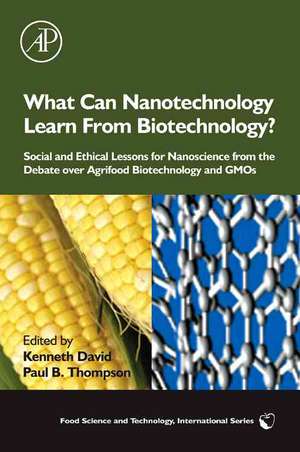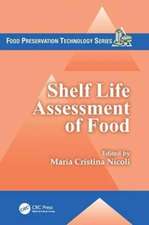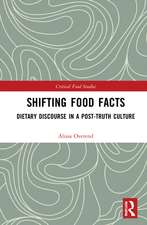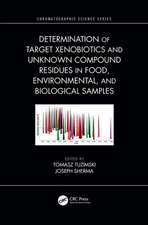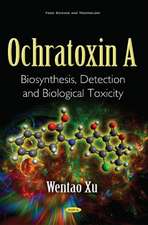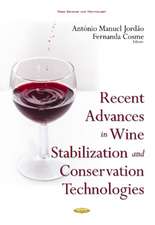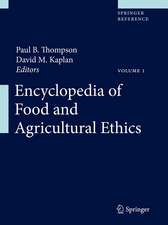What Can Nanotechnology Learn From Biotechnology?: Social and Ethical Lessons for Nanoscience from the Debate over Agrifood Biotechnology and GMOs: Food Science and Technology
Editat de Kenneth David, Paul B. Thompsonen Limba Engleză Hardback – 15 apr 2008
This book details the lessons to be learned from the controversy over genetically modified foods, and how those lessons can be applied to developing nanotechnologies, particularly agricultural and other food-related applications. Exploring the environmental, social and ethical impact of nanotechnology in addition to the technical and economical impacts, it an ideal reference for any scientist, engineer, research program administrator, resource allocator, and NGO advocate.
- Addresses the growing concern over the responsibility of science to the impacted population
- Uses real-world experience to outline practical approaches for emerging technologies
- Addresses the concerns of science as well as social science
Din seria Food Science and Technology
- 25%
 Preț: 618.61 lei
Preț: 618.61 lei - 22%
 Preț: 1024.09 lei
Preț: 1024.09 lei -
 Preț: 357.25 lei
Preț: 357.25 lei - 22%
 Preț: 842.01 lei
Preț: 842.01 lei - 23%
 Preț: 553.64 lei
Preț: 553.64 lei - 15%
 Preț: 490.10 lei
Preț: 490.10 lei - 18%
 Preț: 1359.95 lei
Preț: 1359.95 lei - 18%
 Preț: 1674.26 lei
Preț: 1674.26 lei - 8%
 Preț: 323.02 lei
Preț: 323.02 lei - 30%
 Preț: 614.87 lei
Preț: 614.87 lei - 18%
 Preț: 2090.27 lei
Preț: 2090.27 lei - 15%
 Preț: 489.26 lei
Preț: 489.26 lei - 29%
 Preț: 1408.52 lei
Preț: 1408.52 lei - 23%
 Preț: 566.29 lei
Preț: 566.29 lei - 13%
 Preț: 385.35 lei
Preț: 385.35 lei - 15%
 Preț: 498.29 lei
Preț: 498.29 lei - 30%
 Preț: 2111.13 lei
Preț: 2111.13 lei - 18%
 Preț: 1827.77 lei
Preț: 1827.77 lei - 18%
 Preț: 2081.08 lei
Preț: 2081.08 lei - 18%
 Preț: 2212.49 lei
Preț: 2212.49 lei - 18%
 Preț: 2220.38 lei
Preț: 2220.38 lei - 18%
 Preț: 2221.95 lei
Preț: 2221.95 lei - 23%
 Preț: 606.02 lei
Preț: 606.02 lei - 18%
 Preț: 2078.06 lei
Preț: 2078.06 lei - 23%
 Preț: 415.15 lei
Preț: 415.15 lei - 18%
 Preț: 2102.06 lei
Preț: 2102.06 lei - 23%
 Preț: 376.17 lei
Preț: 376.17 lei - 18%
 Preț: 1604.01 lei
Preț: 1604.01 lei - 18%
 Preț: 2770.03 lei
Preț: 2770.03 lei - 18%
 Preț: 1313.74 lei
Preț: 1313.74 lei - 15%
 Preț: 537.13 lei
Preț: 537.13 lei - 18%
 Preț: 2211.41 lei
Preț: 2211.41 lei - 18%
 Preț: 2233.32 lei
Preț: 2233.32 lei - 27%
 Preț: 1420.06 lei
Preț: 1420.06 lei - 18%
 Preț: 1395.65 lei
Preț: 1395.65 lei - 31%
 Preț: 1702.47 lei
Preț: 1702.47 lei - 18%
 Preț: 1926.00 lei
Preț: 1926.00 lei - 29%
 Preț: 1409.34 lei
Preț: 1409.34 lei - 18%
 Preț: 1800.14 lei
Preț: 1800.14 lei - 18%
 Preț: 1336.46 lei
Preț: 1336.46 lei - 18%
 Preț: 1959.17 lei
Preț: 1959.17 lei - 31%
 Preț: 1690.32 lei
Preț: 1690.32 lei - 22%
 Preț: 836.17 lei
Preț: 836.17 lei - 18%
 Preț: 1941.91 lei
Preț: 1941.91 lei - 18%
 Preț: 1222.82 lei
Preț: 1222.82 lei - 18%
 Preț: 701.01 lei
Preț: 701.01 lei
Preț: 534.68 lei
Preț vechi: 694.39 lei
-23% Nou
Puncte Express: 802
Preț estimativ în valută:
102.34€ • 111.21$ • 86.02£
102.34€ • 111.21$ • 86.02£
Carte tipărită la comandă
Livrare economică 22 aprilie-06 mai
Preluare comenzi: 021 569.72.76
Specificații
ISBN-13: 9780123739902
ISBN-10: 012373990X
Pagini: 360
Dimensiuni: 152 x 229 x 23 mm
Greutate: 0.6 kg
Editura: ELSEVIER SCIENCE
Seria Food Science and Technology
ISBN-10: 012373990X
Pagini: 360
Dimensiuni: 152 x 229 x 23 mm
Greutate: 0.6 kg
Editura: ELSEVIER SCIENCE
Seria Food Science and Technology
Public țintă
Researchers, scientists and engineers working in food sciences, but also sciences generally who will appreciate not only the contribution of the information to the field in general, but also as an application of results that have been building in science studies over the past 20 years.The second audience is those scientists who have begun to call for studies on the social, ethical and regulatory questions posed by their sciences. Research administrators and public servants working in regulatory or civil society organizations will find this book valuable as they consider this rapidly evolving technological environment.
Cuprins
Introduction: Putting Nanofears and Nanobenefits in Context; Learning from mistakes: Missteps in public acceptance issues with GMOs; Building a new technology business: A framework for translating biotechnology experience to nanotechnology; Of Hype, Home, and Handles: A Biotechnologiy Activist Looks at Nanotechnology; Values Matters: Science, Technology, and Social Values; The Lessons of Biotech Patenting; The Ethics of Agri-Food Biotechnology: How can an Agricultural Technology be so Important?; Biotechnology, Nanotechnology, Media and Public Opinion; From Bio to Nano: Learning the Lessons, Interrogating the Comparison; Nano and Bio: How are they Alike? How are they Different?; Legal Lessons Learned from Agri-Food Biotechnology and GMOs; Understanding the Basis for Public Acceptance or Rejection of Technology: The Need for Theoretical Integration; Nanotechnology as Viewed by a Research Scientist: A Counterpoint Between Technological Development and Public Acceptance; Conclusions and Reflections for Future Nanotechnologists; Appendix: Participants in the October 2005 Workshop
